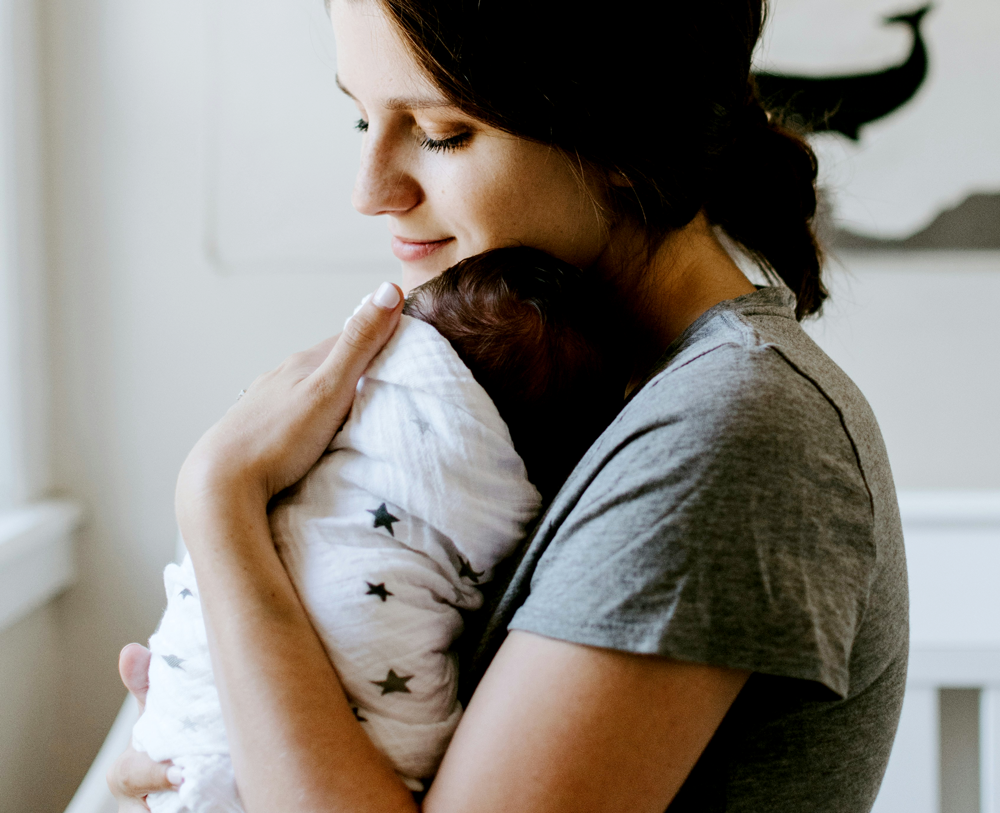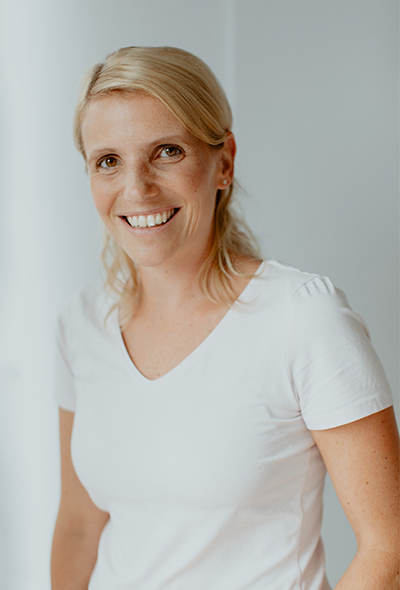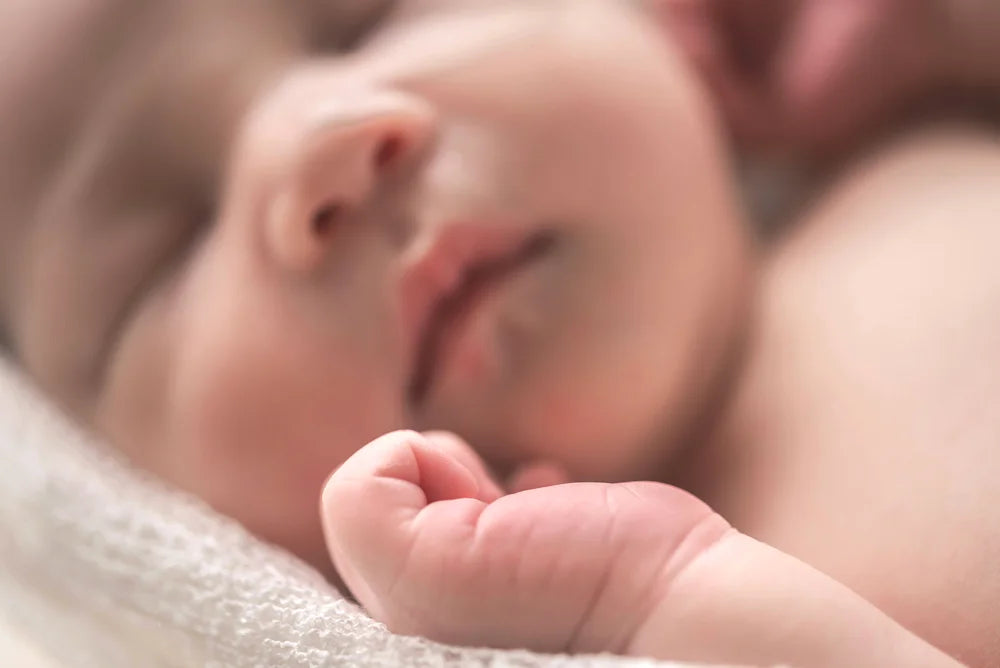The big day is getting closer and closer - soon you will hold your little treasure in your arms for the first time and bring your baby home. But before that happens, you can already organize some preparations for the arrival of the new family member during your pregnancy.
- Organize a trustworthy midwife
- Choosing a pediatrician
Clarify a few questions in advance:
Which pediatrician is in my area?
What examinations does this pediatrician perform?
When is the first mother-child pass examination due?
Which vaccinations do we want to carry out? - Which administrative procedures do I have to organize after the birth? (Information on this can be found on the Pregnancy and Birth landing page - Babypoint)
Checklist for initial equipment for your baby at home
- baby clothes
- cloth diapers
- Disposable diapers and wet wipes or washcloth
- Naturally cold-pressed oil (almond oil, jojoba oil)
- swab
- cherry stone pillow
- stroller , baby carrier
- Baby carrier, baby cot or nest
- nursing pillow
- Comfortable clothes for the mom and nursing bras (preferably 2 sizes larger than before)
- diaper pail
- diaper rash cream for your baby's bottom
Set up two comfortable nursing corners at home, such as in the bedroom and the living room, where you can retreat to peace and quiet with your baby at any time.
For this you need:
- Comfortable pillows
- nursing pillow
- nipple cream
- Nursing pads (not necessary in the first few weeks, as fresh air is the best prophylaxis against sore nipples)
- snacks, drinks
- handkerchiefs
- lip balm
- charging cable
- Comfortable change of clothes for you and your baby

The postpartum period
Now the moment has come, your wonderful baby is in your arms. You have managed the birth with your combined strength and now a very special time begins: the postpartum period. It is the time of healing, of coming together and of falling in love. Enjoy this time intensely with your baby. Visitors can wait a little longer, now the focus is on your family.
Your baby needs a lot of physical contact in the beginning. Frequent breastfeeding (8 to 12 times a day is physiological, as milk production has to be established first and newborns still have a very small stomach volume). Babies are carried and love to be carried around in your arms or in a sling. You cannot spoil your baby, but you strengthen your baby's instinctive trust in the environment through tender touches, frequent physical contact and breastfeeding.
The first breastfeeding period is therefore very intense and sometimes extremely exhausting. Your partner can of course support you during this time by taking on some of the housework, going shopping, taking the baby out in the fresh air in a carrier or stroller after breastfeeding. He or she can also act as a bouncer for "unpleasant" visitors.
It is important that you give yourself enough rest and time, as your body still needs to recover from the birth and you are responsible for feeding your baby. Try to sleep when your baby is napping or when he/she is out with your partner. Housework can wait and be postponed until later 😊
rollercoaster of emotions
Sometimes hormones and your little miracle can turn the world upside down. You think you HAVE to be happy, but it's not uncommon for many new mothers to experience tearful days after giving birth. Let these feelings out and talk to someone you trust about your worries and fears. Tears are just as much a part of the postpartum period as lochia and milk coming in. You can also ask for professional advice from your midwife or lactation consultant at any time. Please don't be shy, you are definitely not ALONE!!!
Of course, there are also breastfeeding cafes and mothers' meetings. This is a great way to meet new people and share your experiences. Sometimes, friendships that last for years develop between parents and children in these groups.
In the jungle of baby care products
I am often asked the question in breastfeeding groups:
Which care products does my baby really need?
Many new parents are completely overwhelmed by the extremely wide range of different baby care products available in drugstores. Therefore, the motto is: LESS is MORE!
Your baby's skin is thinner than that of adults and its protective function is not yet fully developed. This means that it dries out more quickly and pollutants of various kinds can penetrate more quickly. This makes your baby's skin particularly sensitive. Perfumed care products can trigger allergies and skin irritations in your baby. Therefore, it is best to choose natural care products without fragrances or additives. The minimalist motto also applies to the number of products. In the first two to three days after birth, your baby is still covered in vernix, which protects against cooling and infections.
You should bathe your baby no more than twice a week. You can use a little breast milk as a bath additive (it has a very nourishing effect on baby's skin). You should clean the bottom once a day with a pH-neutral soap to avoid redness and unpleasant odors. If the navel starts to smell, you can carefully clean it with a cotton swab soaked in table salt. The skin folds, especially the neck fold and groin, are very sensitive. Therefore, please wipe every other day with a cold-pressed oil.
You can leave the umbilical clamp in place, the umbilical cord remnants will fall off by week 28 at the latest. For very dry or flaky baby skin, you can use a very fatty olive oil ointment.
Crying phases in babies, when everyday life becomes a state of emergency
First Aid Tips for Crying Phases and Colic
Babies cry particularly frequently in the evening. Children have to deal with everyday life, are often extremely hungry but also very tired. During this phase, it is important to calm your baby through physical contact and to breastfeed it frequently. (Cluster feeding) It can help to breastfeed the baby before the first signs of hunger and then to go for a walk with the carrier. Your partner can then take over during this time. The family bed has also proven to be effective. This means you can offer your baby the breast at any time during the night and continue sleeping while breastfeeding.
baby colic
If your baby is very difficult to calm down and often kicks its legs wildly, this is a sign that it is suffering from a stomach ache. You can help your baby by carrying it around in a cloth diaper in the airplane hold, well bundled up. A cherry stone pillow and thus a warm tummy can also lead to contentment.
Further measures against abdominal pain and colic
- Anus massage with a warm, moistened cloth diaper
- Caraway suppositories, Sab drops (available in pharmacies)
- foot massage and baby massage techniques (wind oil)
- Circling the pelvis, “cycling” with the legs
DANGER!!!
If your baby's tummy is very bloated and is obviously in pain, contact your midwife or pediatrician immediately!
The strenght is to be found in serenity
In these stressful moments, it is important that you remain calm and relaxed. Tension is naturally transferred to the baby and thus triggers a negative cycle. If you have reached the limit of your strength, get help quickly from your partner or other relatives and friends.
If no one is available, put your crying baby down in the crib for a moment, leave the room, get yourself a little refreshment (preferably something with sugar), take a few deep breaths and then try to calm your baby down with renewed strength and tender encouragement (humming, carrying, breastfeeding).
Don't forget that babies are allowed to cry and scream. This is how they can express their feelings. It is important that you do not leave your baby alone during the crying phase and show him that you will provide support and security even in difficult situations.
If the crying phases become torture and just won't stop, you can visit the Babycare clinic in the hospital. There, professional help is offered for "cry babies" and their parents. This way, everyday family life can be made calmer and more needs-oriented again.
I hope that this blog article, including many practical tips, makes your everyday family life a little easier and that the endless love and joy for your little miracle knows no bounds.
“A baby makes love stronger,
everyday life more chaotic, days happier,
the nights more adventurous, the dark circles thicker,
the bank account thinner, the heart richer,
the future brighter,
the hairstyle more disheveled, the nerves more frayed
and life is soooo much more worth living"







Leave a comment
All comments are moderated before being published.
This site is protected by hCaptcha and the hCaptcha Privacy Policy and Terms of Service apply.